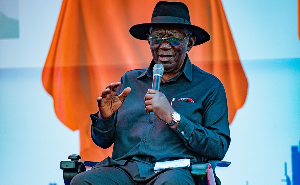Opinions of Thursday, 25 June 2020
Columnist: Evans A Atuick
Osei Kyei-Mensah-Bonsu's quest for parliamentary primaries reform and matters arising
Our folks say a man who is on a serious mission has no time for exchanging pleasantries with neighbors.
Today I am on such a mission and will zoom straight into the action. The matter on my menu today is none other than attempts by the leadership of parliament led by the Hon. Kyei-Mensah Bonsu to initiate political party parliamentary primary reforms to check the organization of parliamentary primaries every four years.
The reason for this move, according to the big man, is to avert the loss of experienced legislators (himself included) in Ghana's parliaments every four years.
https://mobile.ghanaweb.com/GhanaHomePage/NewsArchive/Initiate-reforms-to-end-holding-parliamentary-primaries-every-4-yrs-Parliament-urges-political-parties-985246
I can imagine many Ghanaians already angry at attempts by the leadership of Ghana's parliament to initiate reforms that will keep the long serving MPs in the House forever and ever. Many are those who will say," see these greedy ones yooo, they want to stay in parliament forever!" I am inclined to share this view too.
Like the eminent Professor, Kwaku Azar, I am equally against the attempt to limit competition for parliamentary slots at party level just so long serving members can continue to remain in parliament on the altar of experience regardless of whether they are delivering at the constituency and national levels.
Yes, experience is important but we need competent young ones too to step into leadership positions in the immediate future. The parliamentarians brandishing the experience card as a diplomatic passport to remain in parliament forever didn't get the said experience from eating fufu and abenkwan or t.z and bitto but by contesting,winning, getting into parliament, and learning how to do it properly.
The question is how did they become parliamentarians and experienced ones at that? Some of them toppled sitting MPs and entered parliament but do not want to be contested by anyone again. Suffice it to say that doing parliament work is not nuclear science to require special expertise. That is why all manner of people are scrambling for parliamentary slots just to go into parliament.
As many of our young MPs have demonstrated, one can learn fast on the job and become relevant in parliament. We also have the benefit of having experienced retired parliamentarians who can serve as consultants to train new entrants if the need arises. Of course, we also have a number of experienced MPs in the house whose people keep returning them to parliament for obvious reasons.
It can therefore not true that there is a complete absence of experienced members in every parliamentary session to warrant censoring parliamentary primaries in constituencies with so-called experienced legislators.
One question begging for answers is why has going to parliament suddenly become so attractive and all calibre of persons are scrambling for parliamentary slots, and paying millions in the form of bribes to win and go to parliament.
Some of the amounts of money, currencies, and things being mentioned as gifts for greasing the palms and thumbprints of delegates in the just ended NPP primaries are not only mind-blowing but also just a tib of the iceberg of what happens in actual elections. Some have even ended up with broken noses and punctured mouths as if they just emerged from a WBC 12-round boxing championship of the world fight.
The leadership of parliament led by Kyei-Mensah Bonsu should be more worried about the calibre of folks getting into the House than those leaving because of the potential for a "garbage in, garbage out" situation. This is highly likely if money is placed above competence and knowledge in selecting parliamentarians into the august House. The commoditization of parliamentary elections may also discourage capable but poorly resourced potential MPs from even showing up to contest.
Since Kyei-Mensah Bonsu is interested in electoral reforms at the party level that will impact positively on the quality of parliamentary work, he ought to rather fight for the involvement of all party members in each constituency in the choice of parliamentary candidates. Therefore, he must engage his own party, the NPP, and other parties, to institute reforms that will ensure that all card bearing members of each party in a constituency vote in parliamentary and presidential primary elections instead of allowing a few delegates decide for the silent majority.
The current delegates system is not only undemocratic but also breeds corruption, vote-buying by money bags who may not necessarily have the quality required for effective parliamentary work, and infighting in parties. Opening the electoral system at the party level up for broader participation by the rank and file of parties will level the playing field, thereby encouraging the participation of highly competent but less resourceful candidates.
The truth is we have made parliament look very attractive as a place to get rich overnight given the attactive emoluments and incentives, including V8s and 'retirement' every 4 years with the juicy end of service benefits (ESB) that many teachers and civil servants may work for years and not be able to get as take-home pension.
There is also the lure of getting ministerial appointments if your party wins the presidential elections and has the mandate to form the next government. Hence, 2/3s of ministerial appointments must come from parliament.
The result of this is the wanton absenteeism we witness in parliament on almost daily basis, while parliament has been rended toothless as far as checking the other arms of government, and the executive, in particular, is concerned. How can MPs who double as ministers and board chairmen in the executive arm avoid conflict of interest and political manipulation from the executive arm of government?
Kyei-Mensah Bonsu, the Majority Leader who doubles as Minister for Parliamentary Affairs, knows fully well that in the UK and USA setups, Prime Ministers and Presidents are not forced by law to appoint most ministers from the parliamentary and senate houses respectively. It is also important to bring his attention to the fact that, in those jurisdictions, voting on important matters of state by individual legislators are not only known, but come with documented reasons, and are public record.
Thus, constituents can tell which bill or issue their representative voted for or against and why. It is not surprising that we have long term career legislators in those jurisdictions who have a pedigree for delivering excellence in their capacity as legislators, hence, need not to be changed.
Unfortunately, the aforementioned is not the case in Ghana's parliament where parliamentarians are dictated to by the executive arm of government or party, and just vote on issues like primary school kids without accounting to constituents why they voted in a certain way.
In other words, there is no professionalism in legislative work in Ghana, given that deliberations and voting on important national issues and bills are highly politicized along NPP-NDC or majority -minority lines without critically examining the issues to see what will work or not work in the interest of the nation, and vote accordingly.
Thus, in most cases, voting is simply done emblock by parliamentarians on either side because of the party's position rather than by genuine desire and commitment to serve the national interest. Quite clearly, the majority of parliamentarians are more loyal to their parties than to the nation they claim to supposedly serve, let alone their constituents who voted for them to represent them in the House.
Therefore, the leader of Ghana's parliament, Kyei-Mensah Bonsu, if only he is committed to save the House from brain drain, must seek to clean the House first and cause to happen much needed parliamentary reforms to make parliamentary work more productive, accountable, and transparent to the citizenry. Hence, he must start working on ammendments to remove the compulsory appointments from parliament to most ministerial positions in the executive.
Reforms must be done to allow citizens and constituents know how and why individual Mps debated on bills and voted the way they voted.
One may argue that the parliamentary handset captures all parliamentary activities and so it is needless to call for reforms in terms of making debating and voting more accountable and transparent.
The handset certainly captures attendance and deliberations in the house but does not show votes of individual MPs and reasons for voting a certain way on important bills or matters of national interest. Besides, the readership of the handset is limited. Perhaps, parliament may need its own national newspaper and or websites where detailed information on such issues are made available to the general public.
In fact, we need to demystify parliamentary work, abolished the ESB, outlaw the appointment of most ministers from parliament by ruling governments, make parliamentary work more independent of the executive arm of government, and make parliamentary work more transparent to the people.
Before dropping my pen, I have one advice for Hon. Kyei-Mensah Bonsu and his cohort of experienced MPs: To stay long in parliament and make your experience count, you need to keep performing well in parliament, promptly meet the needs of your constituents( bearing in mind your lofty promises), relate well with your constituency party executives, party members, and constituents. This for me is the only logical way to maintain your experience selves in the house but not to try cajoling and pinholing political parties into monopolizing certain parliamentary seats for so-called experienced MPs.
In a country where we have already seen an attempt by a certain political party to reserve seats for only women fiercely resisted by the rank and file of the party, this attempt to protect long-serving and experienced MPs from competition from impatient and equally power hungry party members will backfire in the end.
Goa chak!
Da yie!
Yours truly,
Evans A Atuick
(Asalpiung)
Graduate student, University of Wyoming, USA
Eatuick78@gmail.com
(I am a citizen but not a spectator)
Entertainment













